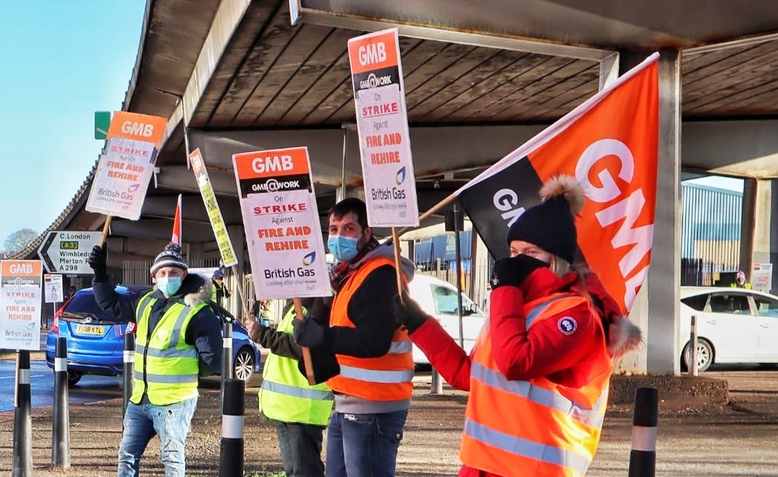 British Gas workers on strike, Photo: GMB
British Gas workers on strike, Photo: GMB
British Gas workers put up a heroic fight but the battle against fire and rehire continues, the movement must learn the lessons, writes Chris Neville
Hundreds of GMB British Gas engineers, many with decades of service to the company, are facing the prospect of unemployment. Yesterday marked the deadline for signing new contracts and in doing so, signing away their long-held terms and conditions, after the company decided to use fire and rehire as an attempt to increase its profits.
Sad scenes across the country saw British Gas vans being collected by vehicle transporters to be delivered back to the company as engineers spoke of anger over their treatment on social media.
It’s been a long and heroic struggle for the engineers, with more than 40 days of strike action since the new year as they sought to overturn their employer’s plans.
Back in April last year, British Gas’s parent company Centrica brought in Chris O’Shea as their new CEO. Within months, O’Shea set about his plans to reduce the terms and conditions of the whole British Gas workforce using fire and rehire. The proposed contractual changes meant reductions to annual leave, sick pay and overtime rates alongside longer working hours.
The two major unions representing the workers were Unison and the GMB. Unison negotiated slightly less harsh terms for its mostly administrative members including a three-year pay freeze and an annual reduction of extra holidays, stretched out over several years. Unison recommended that its members accepted the proposals because they didn’t believe it was possible to get a better deal. Their members voted to accept the new deal in December.
The engineers no doubt held sway as the physical providers of British Gas’s services but the prospect of the entire workforce out on strike in solidarity with one another would have brought the company’s operations to a complete standstill.
The engineers, represented by GMB decided that they would fight, starting with five days of strikes in January and ending yesterday with a total of 43 days and a backlog of hundreds of thousands of repairs and services for British Gas. Along the way, the strikes were postponed on several occasions as the union, ACAS and British Gas tried to negotiate a solution.
An acceptable solution, however, could not be found. The company refused to take the fire and rehire plans off the table and offered instead, only a one-off payment to the workers so the strikes resumed.
Despite campaigns from unions and MPs, fire and rehire remains an option for dodgy employers in the UK. With the TUC reporting that 1 in 10 workers have suffered from it during the last year, it is a tool that the bosses are increasingly happy to use as they see fit and clawback extra money from their workforce. Trade unionists must continue the fight to get this outrageous practice outlawed, as it is in many other countries.
If what we are seeing today is a big defeat for the British Gas engineers, had Unison chosen to stand with the GMB and encourage their members to take industrial action, we could have seen a different outcome entirely. The engineers should be commended for their struggle. Their example to workers and bosses alike is never wasted. Workers must continue to resist attacks on their terms on conditions wherever they occur.
But there are some bitter lessons to be learned for the trade union movement. When the employer raised the stakes, a token one day strike (the 43rd) simply wasn’t a serious industrial strategy let alone a strategy to win. Escalation – all out – was necessary, combined with a call for the TUC to coordinate solidarity, both financial and physical, across all affiliated unions. The trade union leaderships failed to deliver a serious industrial strategy to even begin contemplating matching ruthless employers in an equal fight.
It’s clear from the growing number of disputes that there is a widespread mood for fighting fire and rehire practices. More struggles are to come. The lesson to take from this battle is that we need to build the widest possible unity to push back against the bosses’ offensive.
As with the 1971 postal defeat (a very different period and details of course, but a national dispute), we’ve just received a stark warning at the very beginning of a period of likely elevated industrial conflict. The key lesson is that no group of workers can be left to fight in isolation – starting with the Queen’s Road bus workers in Manchester.
Join Revolution! May Day weekender in London
The world is changing fast. From tariffs and trade wars to the continuing genocide in Gaza to Starmer’s austerity 2.0.
Revolution! on Saturday 3 – Sunday 4 May brings together leading activists and authors to discuss the key questions of the moment and chart a strategy for the left.

